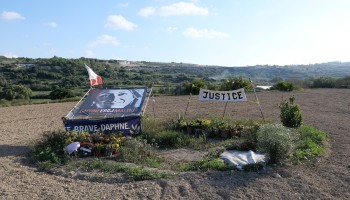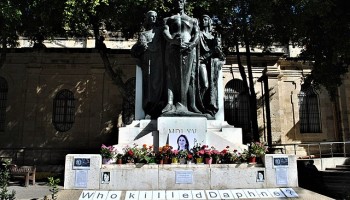Reported by
The men who supplied the bomb that killed Maltese journalist Daphne Caruana Galizia have been sentenced to life in prison, closing one chapter in one of Malta’s most shocking crimes.
Caruana Galizia was an investigative journalist who reported on government corruption, nepotism, patronage, and allegations of money laundering, among others. She died in October 2017 when a bomb planted under the driver’s seat of her car was detonated not far from her home.
Robert Agius and Jamie Vella were convicted on Thursday of complicity in her murder, participation in a criminal organisation, illicit possession of explosives, and complicity in causing an explosion intended to kill. They were found guilty on all counts.
The same trial also saw Vella, Robert’s brother Adrian Agius, and hitman George Degiorgio sentenced to life over the 2015 murder of lawyer Carmel Chircop, who was gunned down in a garage ambush. Degiorgio, along with his brother Alfred, is already serving a 40-year sentence for his role in Caruana Galizia’s murder.
"Both murders were premeditated," Judge Edwina Grima as Robert Agius sat with his head hung down throughout the sentencing. When Grima pronounced the verdict, he made a hand gesture that appeared to mean “it’s finished.” He looked out toward the gallery, where his wife Denise was seated behind a row of policemen and blew her a kiss.
“This should send a strong message to society, not just to the victims’ families, but to the public both locally and internationally,” Prosecutor Anthony Vella said earlier.
Known locally by their family nickname “Tal-Maksar” - the Agius brothers and Vella were arrested in February 2021, just hours after one of the hitmen Vince Muscat—nicknamed il-Koħħu—struck a deal with prosecutors to testify in both cases.
Muscat’s testimony proved crucial, linking Robert Agius and Jamie Vella to the bomb, and exposing the operations behind both murders.
The plan to kill Caruana Galizia surfaced in 2017. According to Muscat, Melvin Theuma—the middleman who received a presidential pardon to testify against alleged mastermind Yorgen Fenech—approached Degiorgio to arrange the murder.
In court, Muscat described how the men initially plotted to shoot Caruana Galizia through her kitchen window with a scoped rifle brought by Vella and Agius—until Degiorgio lost his nerve.
When that plan fell through, they turned to an explosive device. Muscat recounted how he and Alfred Degiorgio transported the bomb to a garage that had previously housed the getaway car used in Chircop’s murder. The device was placed in Caruana Galizia’s car the night before she was killed.
Muscat also told jurors about the aftermath—detailing the gang’s efforts to clear their hideout in Marsa and await the police raid.
Muscat began cooperating with investigators in 2018, several months after his arrest in December 2017. According to Theuma, Fenech warned him to “go look for Tal-Maksar because il-Koħħu is revealing the bomb was prepared by them.”
Jurors even heard how Muscat’s father-in-law was allegedly offered €1,500 a month by Vella and Agius to buy his silence.
The life sentences handed down to Agius, Vella, and their associates mark a decisive moment in Malta’s efforts to secure justice for Daphne Caruana Galizia.
The Caruana Galizia family welcomed the verdict but stressed that much remains unresolved, pointing to ongoing institutional failures. Her son, Matthew Caruana Galizia, vowed that their fight for justice continues and reaffirmed their commitment to upholding Daphne’s legacy and ideals.
“We hope that today’s sentences will be a step towards a safer world for journalists by signalling to potential killers that there are heavy penalties to pay when a journalist is murdered,” the family said in a statement after the sentencing.






